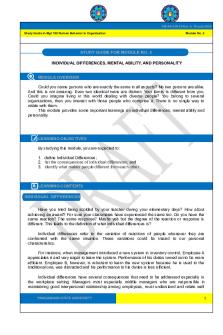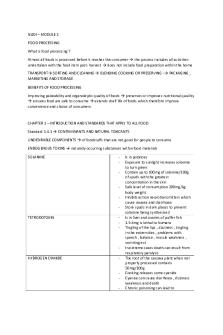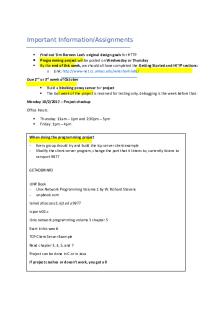Module 2 - Lecture notes 2 PDF

| Title | Module 2 - Lecture notes 2 |
|---|---|
| Author | Ekamjot Pandher |
| Course | Food Safety, Smart Serve and First Aid |
| Institution | Centennial College |
| Pages | 4 |
| File Size | 69.3 KB |
| File Type | |
| Total Downloads | 3 |
| Total Views | 128 |
Summary
SmartServe...
Description
Module 2 Liquor Sales Regulations and Requirements Under the Liquor License Act, establishments wishing to sell or serve alcohol to the public must have a valid Liquor Sales license and must fellow a strict set of regulations that apply to selling and serving alcohol.
Liquor Sales license -
Required by any business wishing to sell or serve alcohol to the public on their premises (issued by the Alcohol and Gaming Commission of Ontario)
Take Home the Rest (THR) -
-
-
License establishments may allow guests to remove unfinished bottles of commercially made wine that brought onto premise under Bring Your Own Wine (BYOW) program or ordered from the establishment as part of guest meal. If a guest wants to take the remaining wine home with them, licensed establishment must reseal the partially consumed bottle of wine, making sure that the cork is flushed with the top of the bottle. Guests are not permitted to take home unopened bottles of wine under the THTR program unless it is wine bought by guest under BYOW. THTR program only applies to wine. It does not apply to spirits or beer. Establishments cannot offer THTR if the guest is intoxicated or approaching intoxication.
Minimum age for service -
Alcohol may not be sold or served to anyone less than 19 years of age. Only individuals 18+ years of age may sell or handle alcohol in a licensed establishment. Must have successfully completed Smart Serve training. Serving alcohol includes taking and serving drink orders, stocking refrigerators or bars, and bartending.
A Licensed Establishment -
-
Can only sell and serve alcohol purchased under its liquor license through government stores. If granted, a BYOW endorsement, license is allowed to serve commercially made wine brought by guest. Must ensure all alcohol sold and served is consumed in licensed area, an exception for wine. Must offer a variety of light meals and alcohol-free beverages. Must not substitute one type of alcohol for another without guest consent. Must not require guest to purchase a minimum number of drinks in order to gain or remain the premises. Must not water down or alter a drink without guests permission Must not permit round-bottomed “shooter” vials or test tubes
-
Must post signs warning women that drinking alcohol during pregnancy causes Fetal Alcohol Spectrum Disorder (FASD).
Drinking in the washroom -
Allows customers to have alcoholic beverages in washroom, hallways, and stairwells.
Hours of Operations Monday to Sunday 11am – 2am New Year’s Eve 11am – 3am - Establishments cannot serve after 2am, even when ordered 1:55am. - All alcohol and containers (including empty glass and bottles) must be cleared 45 minutes of stop service.
Role of AGCO -
Responsible for regulating sales and services of alcohol to public within establishments Reviewing liquor sales applications Issuing, transferring and reviewing liquor sales license Issuing endorsements Inspecting licensed facilities ensuring compliance with LLA Adding terms and conditions to liquor sales
Special Occasions Permits -
Required when an individual/organizer plans to serve alcohol at an event in any location other than residence, private place licensed establishments.
Endorsements -
The AGCO also issues license endorsements to allow an establishment to sell and serve alcohol under specific occasions.
Brew Pub: Allows the sales and service of beer manufactured on premises for consumption of same premises. Wine Pub: Allows the sales and service of wine manufactured on premises for consumption of same premises. Caterer: Allows the licensee to sell and serve alcohol off license premises. The catered event must be sponsored by someone. Room Service: Allows license to sell and serve alcohol to registered guest in hotel room that is rented for overnight accommodation. Mini Bar: Allows license to sell and serve alcohol from mini bar in room rented for overnight accommodation. Golf Course: Allow license to sell and serve alcohol for consumption on playing area of golf course. Bring Your Own Wine: Allow the license to serve commercially made wine bought by a guest in same number manner of wine as selected from menu.
Civil Liability -
Server or an establishment is not careful in stopping harm or injury to a guest, may found civilly liable for negligence. Civil liability is a potential responsibility for payment of damages. Different from criminal liability, refers to criminal charges laid by police. Determined by courts in form of judgement, usually after a trial of evidence by applying common law. Common law is a system of law based on judges decisions in similar codes in past.
Maximum fines for not meeting regulations of Liquor License Act are: -
Individual/non-corporation $100,000 or imprisonment for up to 1 year or both Individual $200,000 or imprisonment for term of no more than 1 year Corporation $500,000
Civil Liability can arise in 3 ways: 1. Under the provisions of Liquor License Act 2. By a court funding Negeligence or lack of Duty Care 3. Under Occupier’s Liability Act Duty of Care -> owned by server to ensure alcohol is not served to an intoxicated guest, or that guest is not served to the point of intoxication.
Occupier Liability -
-
Branch of law dealing with injuries caused by condition of premises or activities that taken place on the premises. Under Occupier’s Liability Act (OLA), the licensee, as an occupier of the premises, has legal duty to ensure that the premises reasonably safe for guest. Need for taking reasonable care increases when guests consume alcohol, especially if they become intoxicated. Occupier is responsible for the conditions of staff/guests on premises and activities carried out on premises. Responsibility of license, management and staff to deter disorderly conduct on properly adjacent to and invincity of premises.
Entries cannot be denied to -
AGCO inspectors Law Enforcement officers Firefighters Government inspectors (i.e., building code inspectors, health inspectors)
Right to eject guests -
Guests who are drunk, aggressive and out of control are not allowed on premises.
-
-
Not permitted by law, to be on premises: A person under 19 years of age when a condition of license states no entry to minors. Guests who have been previously barred from establishment. Guests who have been previously asked to leave returns another day. Person who, according to a condition of license is not permitted to be in establishment at any time. On premises for an unlawful reason or is breaking law: A guest who is rowdy or is intent on causing a fight Guest who is selling illegal products (i.e., drugs), gambling illegally or soliciting for prostitution.
Use of force -
If guest does not leave when requested, the person can be removed with “no more force than necessary”. This means that force must only be used to eject an individual, not to cause harm. All force must stop once the individual has been ejected....
Similar Free PDFs

Module 2 - Lecture notes 2
- 4 Pages

Module 2- Lecture Notes
- 1 Pages

Module 5 - Lecture notes 2
- 1 Pages

Module 5 - Lecture notes 2
- 67 Pages

Module 2 Draft - Lecture notes 2
- 15 Pages

BEE Module 2 - Lecture notes 2
- 18 Pages

Module-2 -FBS-OP - Lecture notes 2
- 62 Pages

Module 2 - lecture
- 6 Pages

2 - Lecture notes 2
- 5 Pages

UCSP Module 2 - Lecture notes 1-18
- 28 Pages

NSTP-2-Module - Lecture notes 1
- 89 Pages
Popular Institutions
- Tinajero National High School - Annex
- Politeknik Caltex Riau
- Yokohama City University
- SGT University
- University of Al-Qadisiyah
- Divine Word College of Vigan
- Techniek College Rotterdam
- Universidade de Santiago
- Universiti Teknologi MARA Cawangan Johor Kampus Pasir Gudang
- Poltekkes Kemenkes Yogyakarta
- Baguio City National High School
- Colegio san marcos
- preparatoria uno
- Centro de Bachillerato Tecnológico Industrial y de Servicios No. 107
- Dalian Maritime University
- Quang Trung Secondary School
- Colegio Tecnológico en Informática
- Corporación Regional de Educación Superior
- Grupo CEDVA
- Dar Al Uloom University
- Centro de Estudios Preuniversitarios de la Universidad Nacional de Ingeniería
- 上智大学
- Aakash International School, Nuna Majara
- San Felipe Neri Catholic School
- Kang Chiao International School - New Taipei City
- Misamis Occidental National High School
- Institución Educativa Escuela Normal Juan Ladrilleros
- Kolehiyo ng Pantukan
- Batanes State College
- Instituto Continental
- Sekolah Menengah Kejuruan Kesehatan Kaltara (Tarakan)
- Colegio de La Inmaculada Concepcion - Cebu




